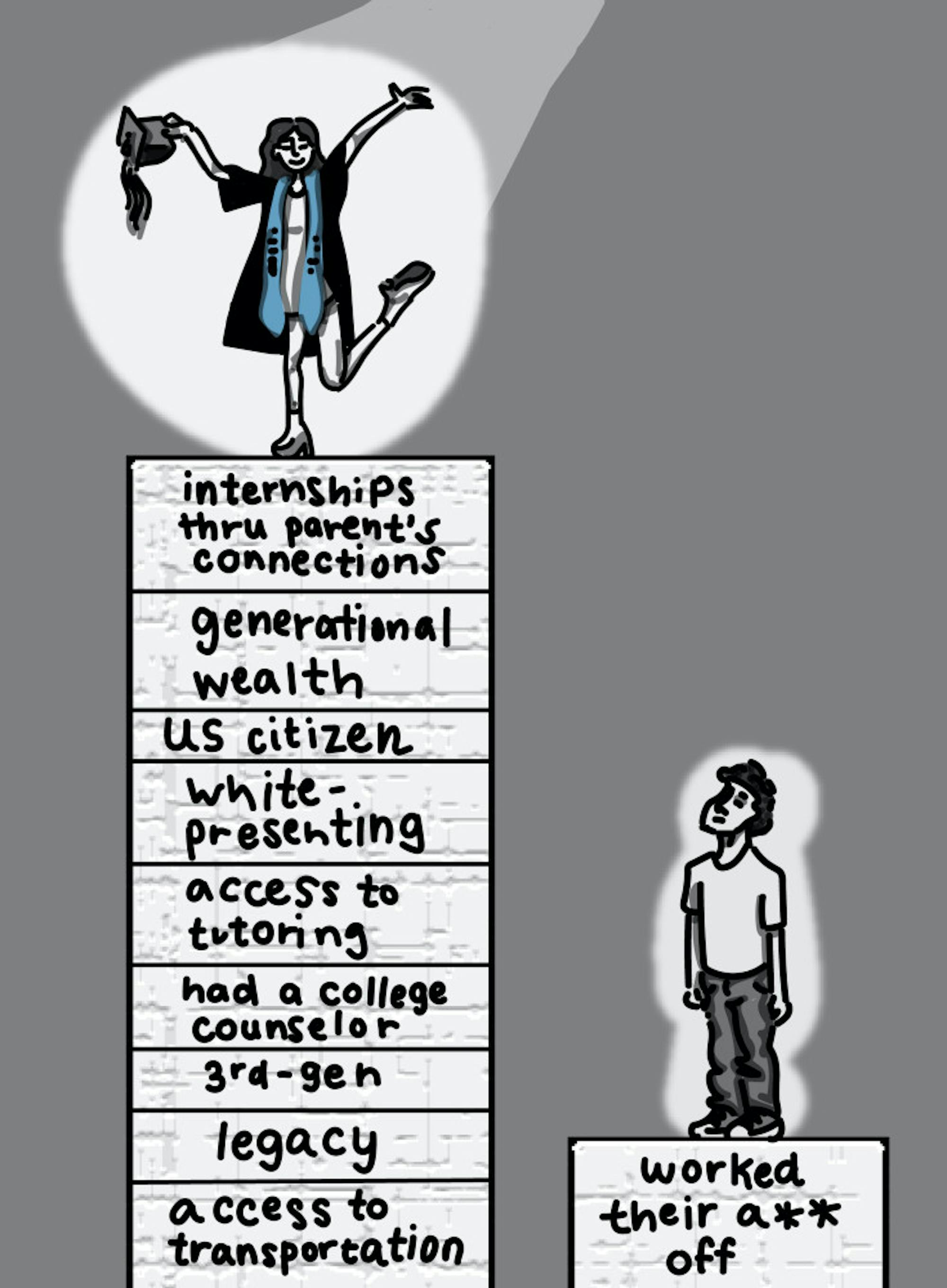A little over a year ago today, I received my acceptance notification from Tufts University. In that moment, as I stared in shock at the blue confetti on my computer screen, all of the sleepless nights, extracurricular activities and college application writing had been seemingly justified.
However, it was also impossible to feel anything but absolutely drained by the college admissions process. The jaded attitude many students have toward the process isn’t necessarily because of the time they put in to get a simple yes or no. Ultimately, no matter how much effort an applicant may put in, or how badly they want or deserve to be at a university, privilege-based barriers persist that prevent many from having a fair shot.
The college admissions scandal that emerged two years ago publicized the illegal behavior that many students and admissions experts already knew existed. On March 12, 2019, the U.S. Department of Justice unveiled a scheme led by William “Rick” Singer in which wealthy parents paid thousands to guarantee their children’s admissions into top universities through Singer’s “side door” operation. This entailed funneling money into a fake nonprofit run by Singer, who would then falsify athletic recruitment or standardized testing to ensure students’ admissions.
The recently released Netflix documentary “Operation Varsity Blues: The College Admissions Scandal” (2021) has reignited discussion regarding the false meritocracy of the U.S. college admissions system. As students, we need to continue shedding light on how both explicit and implicit privileges allow families to continue to game the system with little consequence. But when addressing these inequities, we must also not ignore the role institutions like Tufts play in allowing these advantages to sway admissions, especially while attempting to promote an environment of diversity and inclusion.
The criminal practices and shady influences of ultra-rich families are not the only ways privilege manifests within the college admissions process. Often, there are implicit advantages that improve a student’s application in the eyes of an admissions board. “Harder,” more advanced classes might appear more impressive to colleges and universities. However, the quality of education a student has access to depends largely on their location and socioeconomic background; thus, admissions processes can often serve to institutionalize privilege and reinforce class structures. And even when schools try to take this inequity into account, families with higher incomes often have greater access to the “soft skills” valued in the college process. Having the means to pay for expensive niche sports, private college counselors and other extracurricular pursuits amount to other ways one student can have an unfair advantage over another.
The COVID-19 pandemic has further exacerbated barriers for students with limited access to activities both in and out of school. As many universities and colleges implemented test-optional policies, it is likely that many have come to weigh the nonacademic portions of an application more heavily. The barriers to support and communication in an online environment also make it much harder to navigate the required application forms. This, combined with the immense financial and personal pressures induced by the pandemic, has contributed to a decline in the number of low-income applicants this past admissions cycle. The Common Application reported that the number of students “whose family incomes were low enough for them to have the fee waived fell by 2 percent,” while the number of students filling out the FAFSA form decreased by more than 12% nationwide.
It would be remarkably easy to place all of the blame onto uber-wealthy families who abuse their privileges to the fullest extent. At least, that’s the narrative that some universities implicated in the scandal promote. Wanda M. Austin, former interim president of the University of Southern California, called her university a “victim” and isolated the incident to those involved, stating, “It is immensely disappointing that individuals would abuse their position at the university this way.” However, it is these colleges that allow these abuses to occur. By continuing policies such as legacy admissions and thus failing to address the innate elitism and financial motivations within their admissions processes, prestigious universities are just as guilty — if not more so — than those who directly broke the law.
Tufts University ranks 10th in the nation on a list of colleges that admit more students from the top 1% of household incomes than the bottom 60%. The university cannot continue to claim that it is a “diverse” and “inclusive” environment when such an overwhelming portion of its students come from this level of wealth. As a student body, we need to pressure our school to end the “back door” of elitism and privilege that allows wealthier students to get admitted at disproportionately high rates. Unless we understand that the fault lies primarily in a university’s complicity, the college admissions process will never truly be a meritocratic one.





